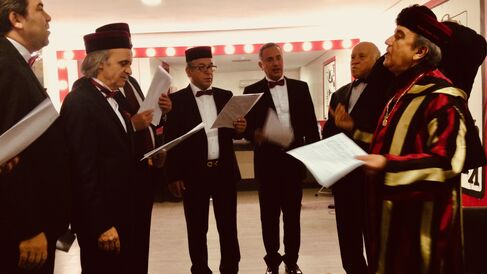to
Lightfoot Room, Faculty of Divinity

About
Part of the Research Seminar in Inter-Religious Relations series
Abstract
This talk will explore the multiple manners in which both the acoustic establishment of Jewish belonging and participation, and the reception of sonic allegiance help build a symbolic order that confirms the intrinsic relation of the Jew to the diverse nation in contemporary Morocco through the heritagization of a communal sounded voice. Jewish and Amazigh relationships to land and cycles, the shared tradition of Arabo-Andalusian repertoires which straddle liturgical and secular settings, women's music in the vernacular, and the recent increased public performance of Jewishness as an intrinsic element of the secular component of Morocco, are parts of a multi-faceted approach to mobilise these musical encounters against radicalisation.
About the Speaker
Dr Vanessa Paloma Elbaz, Faculty of Music
Vanessa Paloma Duncan-Elbaz has a Ph.D. from the Sorbonne’s CERMOM research group of the INALCO (Center for Middle Eastern and Mediterranean Studies of the National Institute for Oriental Languages and Civilization). Her dissertation “Contemporary Jewish Women’s Songs from Northern Morocco: Core Role and Function of a Forgotten Repertoire.” which received “félicitations du jury” was nominated for the best dissertation of the year of INALCO for 2018. She is an alumna the Early Music Institute at Indiana University’s School of Music (MM) where she studied vocal performance practice of Medieval and Renaissance secular monody under Thomas Binkley and Paul Elliott. Her undergraduate studies in vocal performance were at Oklahoma Baptist University and Universidad de los Andes (BM Magna Cum Laude). Vanessa was a Senior Fulbright Research Scholar to Morocco in 2007-2008 and Research Associate of the Hadassah Brandeis Institute of Brandeis University (2009-2016).
In 2014, she founded KHOYA: Jewish Morocco Sound Archive to collect, digitize, classify, and analyze contemporary and historical sound recording of Moroccan Jews.A 2014-2016 Posen Fellow and 2015-2018 Research Fellow of the Tangier American Legation Institute for Moroccan Studies, her research and publications focus on identity transmission, and the use of music and language in interactions between Moroccan Jews and the majority culture.Her research has been supported by the American Institute for Maghrib Studies, Maurice Amado Foundation, Righteous Persons Foundation, and California Council for the Humanities amongst others.
Vanessa has an international performance career as a singer of Moroccan Jewish repertoires and has been described as “a kind of one-woman roving museum of her own” by The New York Times. Her groundbreaking performances and lectures on five continents—including Los Angeles’ World Festival for Sacred Music, Paris’ Institute du Monde Arabe, Bogotá’s National Museum, Santa Fe’s Crypto-Judaic Studies Conference, and Ifrane’s Hillary Clinton Center for Women's Empowerment at Al Akhawayn University—have been featured on PBS, NPR, PRI, I24, France24, and Al Jazeera International amongst others.
Contact
Giles Waller
